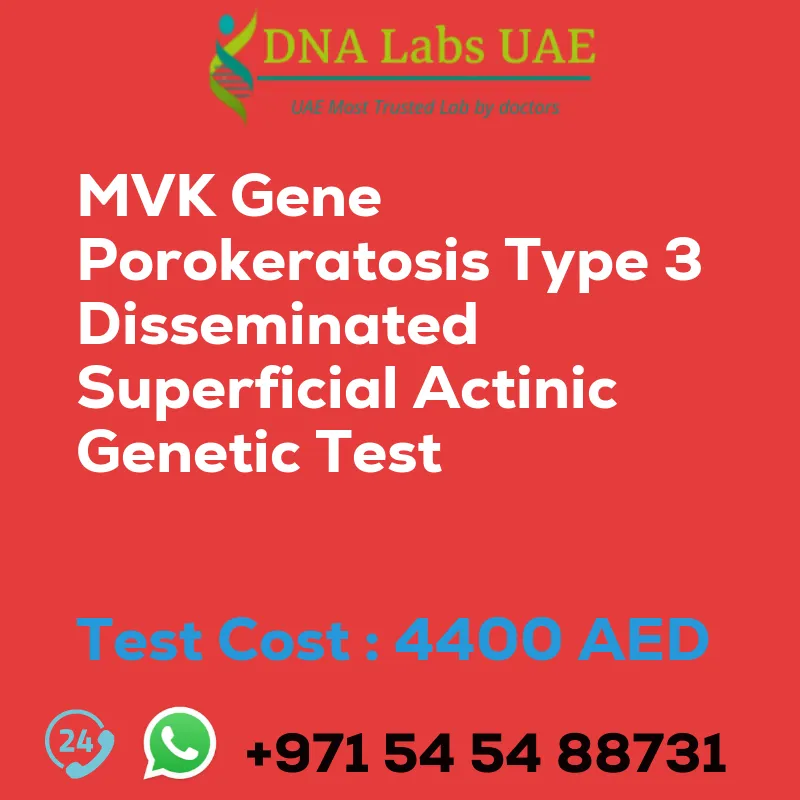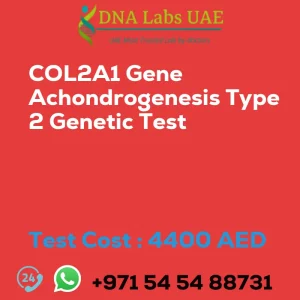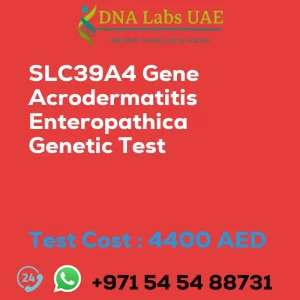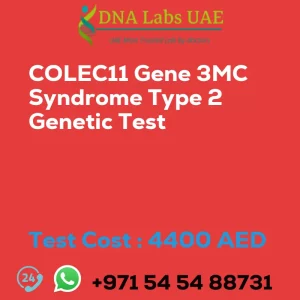MVK Gene Porokeratosis Type 3 Disseminated Superficial Actinic Genetic Test
Introduction
DSAP is a rare skin disorder characterized by multiple small, raised, and scaly patches on sun-exposed areas of the skin. It is caused by mutations in the MVK gene, which is responsible for encoding the enzyme mevalonate kinase. This enzyme plays a role in the production of cholesterol and other essential molecules in the body.
Test Details
The NGS Genetic Test for MVK Gene Porokeratosis type 3, disseminated superficial actinic (DSAP) is a genetic test that utilizes Next-Generation Sequencing (NGS) technology to analyze the MVK gene for specific mutations associated with DSAP. The test aims to identify specific mutations in the MVK gene that are known to be associated with DSAP.
Components
- Test Name: MVK Gene Porokeratosis type 3 disseminated superficial actinic Genetic Test
- Price: 4400.0 AED
- Sample Condition: Blood or Extracted DNA or One drop Blood on FTA Card
- Report Delivery: 3 to 4 Weeks
- Method: NGS Technology
- Test type: Osteology Dermatology Immunology Disorders
- Doctor: Dermatologist
- Test Department: Genetics
Pre Test Information
Clinical History of Patient who is going for MVK Gene Porokeratosis type 3, disseminated superficial actinic NGS Genetic DNA Test. A Genetic Counselling session to draw a pedigree chart of family members affected with MVK Gene Porokeratosis type 3, disseminated superficial actinic NGS Genetic DNA Test gene MVK.
Test Process
The test typically involves collecting a blood or saliva sample from the patient, which is then sent to a laboratory for analysis. The laboratory uses NGS technology to sequence the MVK gene and identify any potential mutations.
Benefits of Genetic Testing
Genetic testing for MVK Gene Porokeratosis type 3, DSAP can be useful for individuals with suspected or confirmed DSAP, as well as their family members. It can provide information about the genetic basis of the condition, aid in genetic counseling, and help guide treatment decisions.
Interpretation and Genetic Counseling
It is important to note that genetic testing is typically performed by healthcare professionals with expertise in genetics. The results of the test should be interpreted in the context of the patient’s clinical presentation and family history, and genetic counseling may be recommended to discuss the implications of the test results.
| Test Name | MVK Gene Porokeratosis type 3 disseminated superficial actinic Genetic Test |
|---|---|
| Components | |
| Price | 4400.0 AED |
| Sample Condition | Blood or Extracted DNA or One drop Blood on FTA Card |
| Report Delivery | 3 to 4 Weeks |
| Method | NGS Technology |
| Test type | Osteology Dermatology Immunology Disorders |
| Doctor | Dermatologist |
| Test Department: | Genetics |
| Pre Test Information | Clinical History of Patient who is going for MVK Gene Porokeratosis type 3, disseminated superficial actinic NGS Genetic DNA Test. A Genetic Counselling session to draw a pedigree chart of family members affected with MVK Gene Porokeratosis type 3, disseminated superficial actinic NGS Genetic DNA Test gene MVK |
| Test Details |
The NGS Genetic Test for MVK Gene Porokeratosis type 3, disseminated superficial actinic (DSAP) is a genetic test that utilizes Next-Generation Sequencing (NGS) technology to analyze the MVK gene for specific mutations associated with DSAP. DSAP is a rare skin disorder characterized by multiple small, raised, and scaly patches on sun-exposed areas of the skin. It is caused by mutations in the MVK gene, which is responsible for encoding the enzyme mevalonate kinase. This enzyme plays a role in the production of cholesterol and other essential molecules in the body. The NGS Genetic Test for MVK Gene Porokeratosis type 3 aims to identify specific mutations in the MVK gene that are known to be associated with DSAP. By analyzing the patient’s DNA sample, the test can determine whether there are any pathogenic variants or mutations in the MVK gene. The test typically involves collecting a blood or saliva sample from the patient, which is then sent to a laboratory for analysis. The laboratory uses NGS technology to sequence the MVK gene and identify any potential mutations. The results of the test can help confirm a diagnosis of DSAP and provide information about the specific genetic variant involved. Genetic testing for MVK Gene Porokeratosis type 3, DSAP can be useful for individuals with suspected or confirmed DSAP, as well as their family members. It can provide information about the genetic basis of the condition, aid in genetic counseling, and help guide treatment decisions. It is important to note that genetic testing is typically performed by healthcare professionals with expertise in genetics. The results of the test should be interpreted in the context of the patient’s clinical presentation and family history, and genetic counseling may be recommended to discuss the implications of the test results. |








